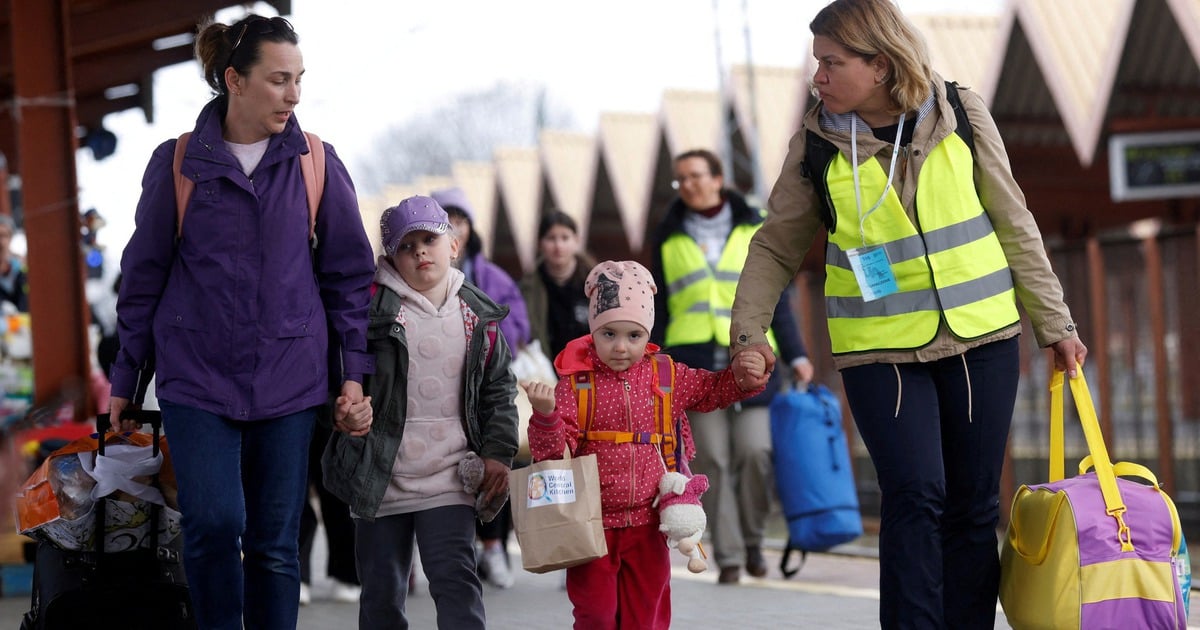Like millions of her compatriots, Valentyna Vysotska, a hairdresser, fled Ukraine for Germany when Russia launched its military campaign there. After a 10-month intensive German course, she found work at a hair salon in Berlin.
“My German is not good but my boss, colleagues and customers are very understanding,” Ms Vysotska, 54, told the French news agency AFP.
German Chancellor Olaf Scholz said Ms Vysotska was an example he wished he could see more of. Of the Ukrainian refugees who have arrived in Germany in the past two years, only 170,000 have found work.
Mr Scholz himself has recently urged newcomers to stand on their own two feet rather than rely on welfare. “We have given them integration and German language classes. Now they have to find work,” the head of the federal government said.
The urgency is driven not just by financial reasons. The cost of welcoming the newcomers is certainly huge – some €5.5-6 billion ($5.4-6.1 billion) has been earmarked for Ukrainians this year.
But Germany is also facing a serious shortage of workers, while Ukrainian refugees could do more. And there is a “political imperative” for Mr Scholz’s government to produce more integration success stories.

A job fair for Ukrainian refugees, in Berlin, 2022. Photo: DW
Immigration and integration were hot topics in the recent European Parliament elections, with the far-right arguing that Europe's largest economy, currently ailing, needs to look after itself first.
Notably, the far-right AfD entered the German parliament (Bundestag) in 2017 following mass outrage over the influx of millions of Syrians and Iraqis over the previous two years, and Mr Scholz’s government has been wary of what might happen if that fury were to repeat itself.
In an effort to appease the far-right, the German government has recently moved to tighten regulations for asylum seekers. Among other things, it has introduced a new payment card that provides social assistance to refugees in the form of credit that can only be used locally – effectively cutting off the ability of migrants to send cash back to their home countries.
But for Ukrainian refugees in particular, the key to the government's strategy is getting them into a job market that is severely short of workers.
For example, Ms Vysotska's boss, Civan Ucar, recalls the relief of finding the Ukrainian, who had 35 years of hairdressing experience back home, at a job fair.
“It is very difficult to find qualified staff,” he said, pointing to Germany’s aging population. Mr. Ucar shrugged off Ms. Vysotska’s poor German skills, saying they would only improve once she got a job.
“We learn German faster at work because we are forced to talk to our colleagues,” he says.
But language is just one of many obstacles for job seekers in Ukraine.
Andreas Peikert, who runs a job centre in Berlin, told the TAZ daily that Ukrainians seeking refuge in Germany were mainly women and children, but “we have too few kindergartens and schools”.
“If a mother can't be sure where she can get child care, she won't look for a job,” Peikert points out.
A study by the Friedrich Ebert Foundation also found that Germany imposes far more administrative barriers than countries like Poland or the Netherlands, where about 60-70% of Ukrainians are employed.
Professionals must have an equivalent qualification in Germany to be allowed to practice and must apply for a qualification to be approved and recognized by the competent authority.
A high level of German is often required for office work, essentially excluding many newcomers who have difficulty learning a new language from scratch in adulthood.
To smooth the process, the German government is pushing large companies to be more lenient with language requirements and offer help to new employees to improve their skills.
But at the same time, the German government says newcomers must also lower their expectations and take the first step.
“The point is not to find your dream job but to enter the job market and then gradually climb the ranks,” said German Labor Minister Hubertus Heil .
Minh Duc (According to AFP/Kyiv Post)
Source: https://www.nguoiduatin.vn/duc-yeu-cau-nguoi-ti-nan-ukraine-lam-viec-a668509.html



![[Photo] "Beauties" participate in the parade rehearsal at Bien Hoa airport](https://vstatic.vietnam.vn/vietnam/resource/IMAGE/2025/4/11/155502af3384431e918de0e2e585d13a)



![[Photo] Looking back at the impressive moments of the Vietnamese rescue team in Myanmar](https://vstatic.vietnam.vn/vietnam/resource/IMAGE/2025/4/11/5623ca902a934e19b604c718265249d0)
























![[Photo] Summary of parade practice in preparation for the April 30th celebration](https://vstatic.vietnam.vn/vietnam/resource/IMAGE/2025/4/11/78cfee0f2cc045b387ff1a4362b5950f)





























































Comment (0)